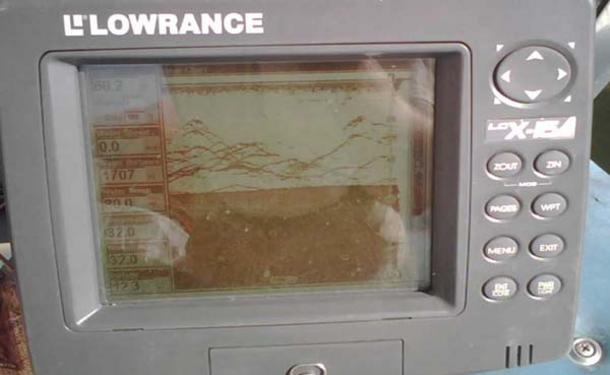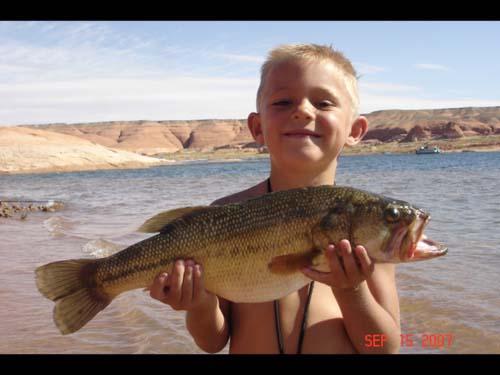Long Range Fish Report
From Sportfishing
From Sportfishing
Fish Report for 9-26-2007

Lake Powell Fish Report 09-26-07
9-26-2007
Wayne Gustaveson
Details of this report will include general concepts that will work through mid October. I will be on vacation for two weeks so there will be no new fish reports until I return.
Water temperature continues to fall as nights are cool and days short. In springtime temperatures in the 60's and low 70's are the periods of greatest fish activity. That works just the same in Fall. Expect bass, stripers, walleye and sunfish to feed heavily before it cools enough to cause inactivity in forage fish and predators alike.
Bass are feeding on shad, sunfish and crayfish in shallows. Lake level decline is stranding more aquatic weed beds each day. Forage fish hiding in weeds must relocate as the weeds dry up. Sunfish and shad are vulnerable to predation during the relocation process. Largemouth bass are very shallow as they live in the grass with sunfish. They can be caught next to shore or on very shallow flats that may not be deep enough for boat operation. Find weeds and largemouth are close. Use surface lures or weedless presentations to fish shallow weeds. Plunking a fluke or senko into an open pocket in a weed mat can be deadly.
Smallmouth bass will be on rocks because that is their preferred habitat. That means crayfish are more important in their diet. If prey fish swim by they will attack, but their primary search image is bottom oriented. Fishing with bottom bouncing grubs/tubes in open water is more likely to be rewarded with smallmouth than any other species. Crayfish imitating lures fished slowly on the bottom around rocks is the best technique for catching smallmouth bass. As I write this, smallmouth bass are more often found on the "outside edges" meaning they are more likely to be on the main channel side of a rock, instead of the side nearest shore. That can change on a daily basis, but for starters look on the deep water side of a rock ridge and then adjust as needed.
Striped bass are hungry and constantly looking for fish forage in open water. They are most talented at feeding and trapping prey in open water. They have little finesse while working a weedy bottom near shore. A good general strategy is to fish the outside reefs for bass while keeping an eye on the graph for fish in deep water. A spoon can be rigged and waiting. Employ the spoon at the first sign of multiple fish at 30 feet or deeper. These fish could be a school of larger bass or a striper school. Either one will be fun.
Active stripers will respond immediately to a shad (spoon) dropped into a school. Stripers are so competitive that they rush to see which fish can get the shad first. The entire school responds to a single feeding opportunity. Draw the school off the bottom by hooking one fish, and keep them going with a shower of anchovy chum at 10 minute intervals. Striper schools will suspend under the boat, often following it, and actively feed, sometimes for hours, as long as bait is presented.
Some striper starting spots include: Warm Creek near the floating restroom, Rock Creek in all three arms, Oak Canyon, Piute and Neskahi Canyon on the San Juan, main channel near mouth of Long Canyon, main channel at buoy 86A, dome rock in Bullfrog Bay, mouth of Knowles Canyon, and Striper City from the horn at Good Hope to White Canyon.
Don't be surprised to catch a big catfish, walleye, sunfish or crappie. All fish are active at this temperature range.
Water temperature continues to fall as nights are cool and days short. In springtime temperatures in the 60's and low 70's are the periods of greatest fish activity. That works just the same in Fall. Expect bass, stripers, walleye and sunfish to feed heavily before it cools enough to cause inactivity in forage fish and predators alike.
Bass are feeding on shad, sunfish and crayfish in shallows. Lake level decline is stranding more aquatic weed beds each day. Forage fish hiding in weeds must relocate as the weeds dry up. Sunfish and shad are vulnerable to predation during the relocation process. Largemouth bass are very shallow as they live in the grass with sunfish. They can be caught next to shore or on very shallow flats that may not be deep enough for boat operation. Find weeds and largemouth are close. Use surface lures or weedless presentations to fish shallow weeds. Plunking a fluke or senko into an open pocket in a weed mat can be deadly.
Smallmouth bass will be on rocks because that is their preferred habitat. That means crayfish are more important in their diet. If prey fish swim by they will attack, but their primary search image is bottom oriented. Fishing with bottom bouncing grubs/tubes in open water is more likely to be rewarded with smallmouth than any other species. Crayfish imitating lures fished slowly on the bottom around rocks is the best technique for catching smallmouth bass. As I write this, smallmouth bass are more often found on the "outside edges" meaning they are more likely to be on the main channel side of a rock, instead of the side nearest shore. That can change on a daily basis, but for starters look on the deep water side of a rock ridge and then adjust as needed.
Striped bass are hungry and constantly looking for fish forage in open water. They are most talented at feeding and trapping prey in open water. They have little finesse while working a weedy bottom near shore. A good general strategy is to fish the outside reefs for bass while keeping an eye on the graph for fish in deep water. A spoon can be rigged and waiting. Employ the spoon at the first sign of multiple fish at 30 feet or deeper. These fish could be a school of larger bass or a striper school. Either one will be fun.
Active stripers will respond immediately to a shad (spoon) dropped into a school. Stripers are so competitive that they rush to see which fish can get the shad first. The entire school responds to a single feeding opportunity. Draw the school off the bottom by hooking one fish, and keep them going with a shower of anchovy chum at 10 minute intervals. Striper schools will suspend under the boat, often following it, and actively feed, sometimes for hours, as long as bait is presented.
Some striper starting spots include: Warm Creek near the floating restroom, Rock Creek in all three arms, Oak Canyon, Piute and Neskahi Canyon on the San Juan, main channel near mouth of Long Canyon, main channel at buoy 86A, dome rock in Bullfrog Bay, mouth of Knowles Canyon, and Striper City from the horn at Good Hope to White Canyon.
Don't be surprised to catch a big catfish, walleye, sunfish or crappie. All fish are active at this temperature range.
< Previous Report Next Report >
More Reports
Lake Powell Fish Report 09-19-07
Lake Powell
9-19-2007
After months of water temperatures in the 80's significant cooing has dropped surface temperature to 75. That's a very active...... Read More
Lake Powell Fish Report 09-13-07
Lake Powell
9-13-2007
It is readjustment time as the water begins to cool, the lake level continues to fall and predators try to...... Read More

LongRangeSportfishing.net © 2025. All Rights Reserved.
Website Hosting and Design provided by TECK.net
Website Hosting and Design provided by TECK.net